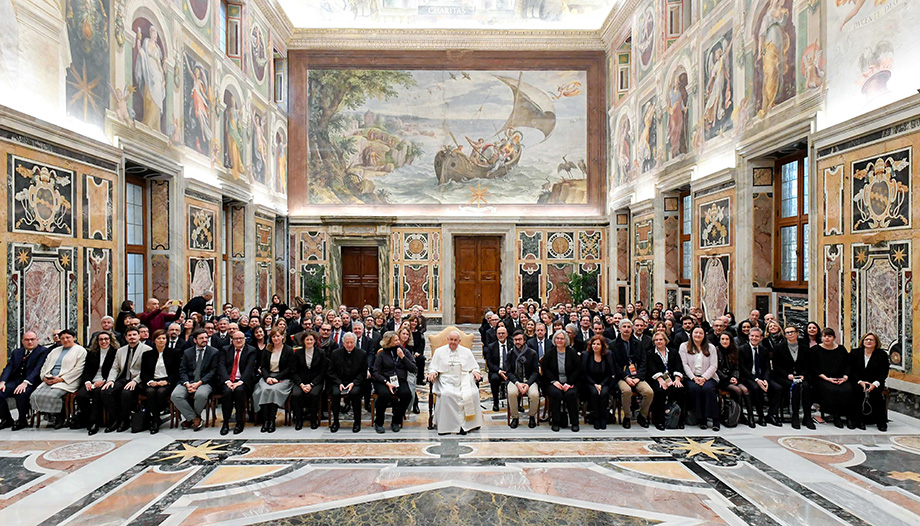Pope Francis received in audience the members of the International Association of Journalists accredited to the Holy See on Monday, January 22, in the Clementine Hall.
During the meeting, the Pope thanked the journalists, "my traveling companions" as he called them, for their informative work on the activity of the Holy See and asked them to forgive him for "the times when the news that concerns me in various ways has taken you away from your families, from playing with your children and from spending time with your husbands or wives".
The Pope encouraged journalists to return to the roots of a vocation, that of journalists who "choose to personally touch the wounds of society and the world. It is a vocation that arises at an early age and leads you to understand, to shed light and to tell."
The Pope cites a book by an editor of Omnes
Pope Francis quoted, in this speech, some words taken from the prologue written by Vatican emeritus Luigi Accattoli to a book of Giovanni Tridente, editor of Omnes in Rome, entitled Becoming a Vaticanist. Religious information in the times of the web.
The quote referred expressly to the work of the Holy See's reporter, which he defined as "a job that is quick to the point of ruthlessness, doubly uncomfortable when applied to a lofty subject like the Church, which the commercial media inevitably take to their level [...] of the market. "In so many years of Vaticanism," he added, "I have learned the art of seeking out and narrating life stories, which is a way of loving humanity [...]. I have learned humility. I have met many men of God who have helped me to believe and to remain human. Therefore, I can only encourage those who want to venture into this journalistic specialization".
The Pope drew on this book to recall that the Vaticanist "will have to resist the native vocation of mass communication to manipulate the image of the Church, as much and more than any other image of the associated humanity. In fact, the mass media tend to deform religious actuality. They deform it both with the high or ideological register and with the low or spectacular register. The overall effect is a double deformation of the image of the Church: the first register tends to force it under a political guise, the second tends to relegate it to light news".
Without sweetening but without creating noise
The Pope did not hide his gratitude for "the delicacy that you so often have in speaking about scandals in the Church: some and many times I have seen in you a great delicacy, a respect, a silence almost, I say, 'ashamed'" and he also highlighted the work to flee from the superficiality of stereotypes that many professionals of information about the Holy See carry out.
"The beauty of your work around Peter is that of founding it on the solid rock of responsibility in truth," the Pope summed up to conclude his address.
"Not to hide the reality and its miseries, not to sweeten tensions but at the same time not to make unnecessary noise" concluded the Pope who encouraged them, first of all, to communicate with their testimony and, as in every audience, he accepted their prayers.
After the Holy Father's speech, the journalists present were able to greet the Pope who stopped especially with some of them, acquaintances of the pontiff after years of following his travels and events.








